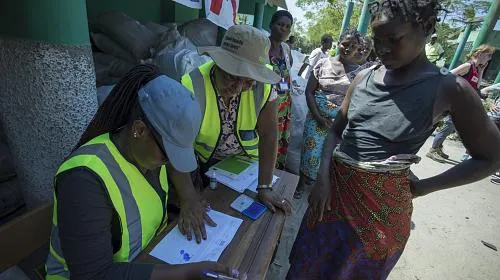MAPUTO – As experts in Mozambique warn of a cholera outbreak, CARE is designing aid distributions to stem the onset of a “second disaster” in the communities worst-affected by Cyclone Idai.
The distribution of relief items has commenced in earnest in Mozambique, Malawi and Zimbabwe, with CARE focusing on providing sanitation, shelter and hygiene kits.
CARE spokesperson, Jennifer Bose said the aid agency’s emergency responders are racing around the clock to help contain the outbreak of deadly diseases such as cholera and malaria.
“We have put together packages that address the very needs of the affected at this stage of the crisis: family tents, hygiene kits, shelter kits and water tanks,” Bose explained from Beira, Mozambique.
“These kits have soap and water purification tablets, that are necessary to stem the outbreak and spread of diarrhea and cholera. We also offer mosquito nets as we are expecting a spike in malaria cases due to the large amounts standing water. While our intentions and strategy are well-founded, we are facing tremendous logistical challenges in bringing our staff and the relief aid to support the victims. There is water everywhere, so we are depending on helicopters and boats. This is not only complicated but is also extremely expensive,” Bose said.
To support CARE’s Cyclone Idai appeal, please click here.
There are fears of a “second disaster” across the region after reports of cholera cases in Mozambique appeared in the media today.
Almost 3 million people have been affected by Idai in Mozambique, Zimbabwe and Malawi; with many of the displaced forced to seek shelter in camps where there is little or no clear water and sanitation.
Mwangitama Chavula, CARE’s maternal child health and nutrition coordinator said: “People are living in tent camps, schools, churches, on roadside and other impromptu places on higher ground. We are even seeing pregnant women sleeping in open spaces; and that of course raises health concerns.
“In one area in Nsanje (southern Malawi), the hospital has been completely submerged by flood waters, and has closed for at least two weeks. Vaccines and medications have been destroyed, and pregnant women’s health books and case notes have also been destroyed so there’s no information about their pregnancies or their medicinal prescriptions. We are working with these communities to keep women and girls healthy and safe. We are also raising awareness about violence against women and providing mothers with the training and skills they need to deal with disaster,” she continued.

